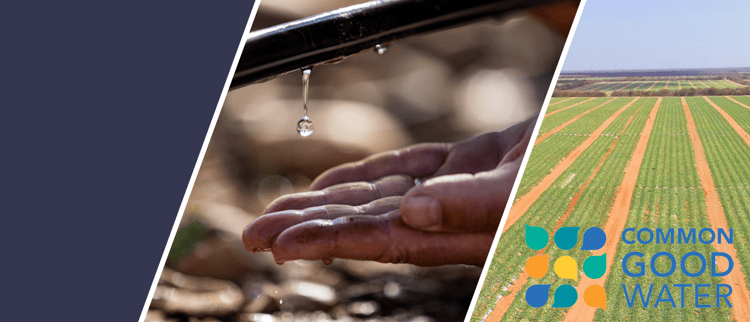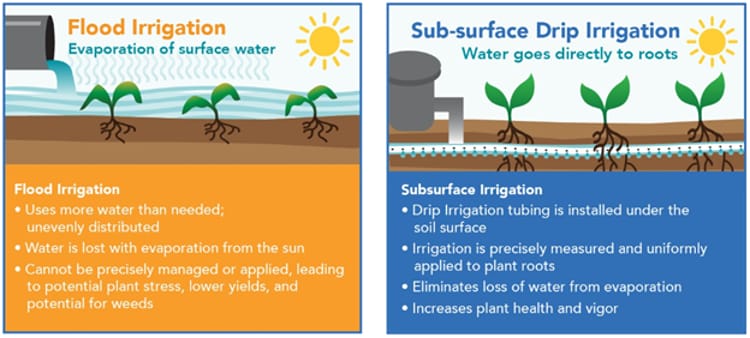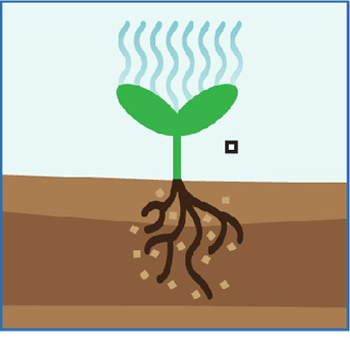Farmer Benefits
![]() Reduce GHGs - Saves money on fertilizer costs because less fertilizer is required due to more precise and efficient application
Reduce GHGs - Saves money on fertilizer costs because less fertilizer is required due to more precise and efficient application
![]() Improve water quality - Precision application of nutrients and water at the crop root zone maximizes crop yield and quality while minimizing resource use
Improve water quality - Precision application of nutrients and water at the crop root zone maximizes crop yield and quality while minimizing resource use
![]() Reduced nutrient and water application improves farm’s ability to stretch resources in a drought
Reduced nutrient and water application improves farm’s ability to stretch resources in a drought
![]() Reduce energy - Saves money on energy use compared to other modernized irrigation because drip irrigation systems operate at low pressure
Reduce energy - Saves money on energy use compared to other modernized irrigation because drip irrigation systems operate at low pressure
![]() Reduce water - Can utilize less water which can also reduce energy required for pumping and treating water
Reduce water - Can utilize less water which can also reduce energy required for pumping and treating water
![]() Improve soil - Maintains optimal soil moisture conditions which supports root growth, nutrient availability, and overall plant health. Reduces soil disturbance from flood irrigation resulting in consistent moisture levels which enhances microbial activity in the soil.
Improve soil - Maintains optimal soil moisture conditions which supports root growth, nutrient availability, and overall plant health. Reduces soil disturbance from flood irrigation resulting in consistent moisture levels which enhances microbial activity in the soil.
Community Benefits
![]() Reduce GHGs - Reduced synthetic fertilizer application results in decreased emissions from fertilizer manufacturing and transportation
Reduce GHGs - Reduced synthetic fertilizer application results in decreased emissions from fertilizer manufacturing and transportation
![]() Improve water quality - Nutrients and water are targeted directly to the crop, which reduces air and water pollution often in disadvantaged communities
Improve water quality - Nutrients and water are targeted directly to the crop, which reduces air and water pollution often in disadvantaged communities
![]() Water quality is improved because crops are the intended target for nutrients and water, minimizing leaching or runoff to water bodies
Water quality is improved because crops are the intended target for nutrients and water, minimizing leaching or runoff to water bodies
![]() Reduce energy - Lower energy use indirectly reduces greenhouse gas emissions associated with energy production
Reduce energy - Lower energy use indirectly reduces greenhouse gas emissions associated with energy production
![]() Reduce water - Energy reduced in the water supply process indirectly lowers greenhouse gas emissions associated with energy production
Reduce water - Energy reduced in the water supply process indirectly lowers greenhouse gas emissions associated with energy production
![]() Improve soil - Optimized soil moisture conditions improve the soil’s ability to sequester greenhouse gas emissions. Creates a favorable environment for beneficial soil microorganisms, supporting nutrient cycling and organic matter decomposition.
Improve soil - Optimized soil moisture conditions improve the soil’s ability to sequester greenhouse gas emissions. Creates a favorable environment for beneficial soil microorganisms, supporting nutrient cycling and organic matter decomposition.







